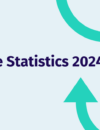
Over 700,000 people in the UK are on the Autism spectrum, but only 1 in 6 Autistic people in the UK have a full-time job. It’s wildly under-discussed that – without reasonable adjustments being made – the workplace can be a daunting experience for Autistic people who often have difficulties with communication and social interactions.
We were lucky enough to speak with Lottie Maddison, LGBTQ+ speaker and Talent and Influencer Manager at Cowshed Social, to get a firsthand insight into how Autism can affect life in the workplace and how working from home during the pandemic has actually helped, in more ways than one.
How does Autism impact your daily work life?
“I mostly struggle with sustaining focus and being ‘on-task.’ I’m so hyper-aware of my surroundings and environment, and can get distracted easily if things don’t feel right. That being said, once I get into something, I can then focus too deeply and find it difficult to move quickly between tasks or forget to take breaks! Music really helps – I listen to a playlist on repeat during the day which allows me to get into my groove pretty readily. It’s taken a lot of practice!
There’s a real difference between my daily work life between the pre-pandemic and today. And mostly for the better (I used to never be able to work if there was a pile of dirty mugs stacked in the office kitchen sink!)
But, I think a negative is that tone is really hard to convey or be perceived over messages. A lighthearted, flippant message over Zoom can easily be misconstrued by anyone, but even more so to an autistic person. I once thought I was literally being fired, but it turns out it was just a typo! As an autistic person, communication, intonation, and social cues aren’t always such innate skills, so the changes to communication styles over lockdown has been hard to get used to.”
How did having a remote interview compare to an in-person interview?
“It was amazing! I was able to fully focus on the interview, rather than be distracted or hypersensitive to my surroundings. I was sat in comfy clothes, in an environment I feel secure in, with notes in front of me to look at when necessary. This meant I was able to articulate better, feel more like myself, and actually enjoy the process.”
Have you ever discussed adjustments in the workplace with an employer – what was the process like and were they effective?
“Yes. I would often get overwhelmed on public transport, at rush hour. I spoke to my very kind line manager who arranged for me to come in earlier (when it is quieter on public transport) and leave earlier, whenever I felt anxious or on edge. It worked really well. Another was that my colleagues used to encourage me to voice record meetings – I always struggle engaging fully and writing notes, short-term memory can be a challenge so to be able to record meetings and listen back is really useful.”
What kind of benefits have you found in working from home?
“So many! The most important thing is having more control over my environment. I can listen to any music or podcast through my headphones to help me get into a deep focus. I can control the temperature, can make sure everything around me is clean/tidy or in its right place. I can have the window open or the heating on, depending on how I feel and I can change outfits or clothes halfway through the day if my moods shift or if something doesn’t feel right.
I can control my physical surroundings to suit where I’m at that day, which makes things less cluttered mentally, and therefore, makes me feel more present and productive.”
Do you think attitudes to Autism in the workplace have changed over the years? What would you like to see in the next few years?
“I think things are improving in many ways. But, I am not sure if it is fast enough. Autism is so deeply misunderstood across all areas of society, and in the workplace one of them. Especially as an adult woman. I think there needs to be an emphasis on, and an effort to, understand that Autism isn’t a tragedy or something wrong. It’s just a different set of rights, with many really admirable qualities. I think it’s important for autistic people to advocate and represent themselves online, but equally, there needs to be just as much effort from neurotypical people to listen, ask questions, and understand.”
How can companies better support people with Autism in the workplace?
In any company, there are pressures to ensure that the office is accessible for everyone. Whilst society often discusses diversity and inclusion in terms of race and gender, there are many adjustments and considerations that need to be made for neurodiverse colleagues.
According to a recent survey by DARE, 87% of neurodiverse people said that making adjustments within the working environment would have a huge impact on their performance at work. The same study revealed that a third of people had their requests for adjustments successfully implemented by their employer; but over half of the respondents found great difficulty requesting adjustments within the workplace.
According to Goldsmiths, University of London, only 12% of employers have received training on Autism; an incredibly low and concerning percentage. A lack of employer training and understanding means that:
- Many employers do not understand the benefits that a person with Autism can have in their workforce and how out-of-box thinkers can give their company a competitive edge
- Organisations do not understand the reasonable adjustments they should make for Autistic applicants and employees
- Organisations do not understand what Autism is and have several outdated misconceptions about neurodiversity in general
There’s a lot of work to be done. With Lottie’s experiences in mind, let’s look at how employers can do better to support people with Autism in the workplace.
Working environment
Autism is a spectrum, with a wide range including high-functioning Autism (HFA). Having an understanding of how an individual’s workday is affected throughout the spectrum structure is important. Some people with Autism benefit from a clear timetable of activities, tasks, breaks and lunches; others would appreciate flexibility based on how they’re feeling (as Lottie’s employer worked with her, on commuting times). Speak to your employee about the adjustments you can make for them, on an individual basis, to make sure you’re offering what’s needed
Consider the sensory stimuli in your office, which can often be overlooked. Sensory Processing Difficulties (SPD) affect over 75% of people with Autism. SPDs are when the brain becomes overloaded due to the five senses – smell, taste, hearing, touch and sight – and individuals can be hypersensitive or under-sensitive to any or all of the senses. If this happens within a working environment, then a person with Autism can find it hard to concentrate on tasks. Try offering noise-cancelling headphones if you’re working in an open-plan office, to prevent noise from being an overloading factor.
For people with Autism, lighting can cause migraines, increase depression symptoms, and decrease the quality of life. Offer a variety of lighting options that could suit the individual, such as adjustable lamps that can be dimmed or brightened as needed.
Communication
As people with Autism often find communicating difficult, it is good practice for employers to assign a mentor or supportive line manager. This is someone who can work closely with the employee, support them with any questions or issues that may arise, and advocate on the behalf of the person with Autism. As Lottie said, having an understanding manager and colleagues who encourage her to voice record meetings makes a massive difference.
This mentor could arrange training for the rest of your team, to help them understand the adjustments they can make for Autistic people in the workplace (and diversity and inclusion at large). Certain communication styles are better suited to Autistic employees, such as providing very specific and clear instructions for a task or ensuring all feedback is kind but direct. If your team hasn’t been trained on these elements of communication, they won’t know the adjustments to make (there’s more information on how to arrange training below).
Flexible working
A working environment with a high number of people may be overwhelming for a person with Autism, as well as the pressures presented by overcrowded public transport, as Lottie told us. Introducing a flexible workday could be a viable solution, as this will allow the employee to start earlier to avoid the hustle and bustle of public transport and leave at an earlier time too.
Working from home on certain days could also help a person with Autism to work to their full capabilities, as the set-up allows the employee to be in full control of their environment and make adjustments to their exact specification.
Company culture/training
Creating an inclusive company culture should be a priority for every company, and it’s achieved by understanding employees, championing hard work and communicating effectively with all members of staff. For a person with Autism, social cues can be a challenge, so all members of staff should be trained to understand how best to support.
Autism.org.uk provides courses that specialise in workplace training, with modules covering topics such as:
- Discussing current thinking about Autism and identify the main areas of difference
- Increasing awareness of the difficulties Autistic people may experience in the workplace and why
- Recognising potential causes of anxiety for Autistic people in the workplace
- Identifying and implementing reasonable adjustments that can support your Autistic colleagues
Training courses like these will help your employees to better welcome and support a person with Autism to the company, which in turn gives the individual confidence and understanding that a support system is in place to help them reach their potential.
You can connect with Lottie and find out more about her work and talks on Twitter or LinkedIn.
At Druthers, it’s our mission and our passion to empower organisations to find the best person to make an impact on their work, from a diverse shortlist of remarkable talent. Get in touch with us to find out how your business can make a positive change to your hiring and retention processes.





